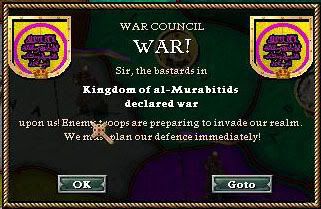
Rome AARisen - a Byzantine AAR
- Thread starter General_BT
- Start date
-
We have updated our Community Code of Conduct. Please read through the new rules for the forum that are an integral part of Paradox Interactive’s User Agreement.
You are using an out of date browser. It may not display this or other websites correctly.
You should upgrade or use an alternative browser.
You should upgrade or use an alternative browser.
Excellently written. It would appear that the Empire is in for some serious problems in the next decade or so. With enemies on two fronts and a potential civil war brewing, Basil has his hands pretty full.
General_BT said:
Do, do do, do!
I was thinking of something else when you were talking about the Greek condition.
Yes, that Mehtar is quite the daft one. 

I find myself vacillating between brothers; in this last update Thomas comes off as more sympathetic that previously, and yet I can't help but feel that perhaps Rhomania would be better off if neither of Basil's children took the throne.
I find myself vacillating between brothers; in this last update Thomas comes off as more sympathetic that previously, and yet I can't help but feel that perhaps Rhomania would be better off if neither of Basil's children took the throne.
Yes. Clearly Rodrigo should launch a coup and begin the Jimenez dynasty!canonized said:A totally entertaining update , BT and definitely on par with your excellent writing ! The conflict between David and Thomas and engrossing . And that Mehtar .. gosh I tire of him ! Bring me back my Rodrigo !
On a more serious note, I feel like Thomas, for all of his ferocity on the battlefield, would not be as good an emperor as David, despite (and perhaps because) of the latter unpleasant personality. That said, I think Thomas’s reign might be more interesting—how often do you get to see a man with no patience for governance attempt to govern an empire?
Engrossing stuff, good job!
David seems to have turned out to be quite the general, the Empire will need such a man when the Mongols come...
 asd
asd
David seems to have turned out to be quite the general, the Empire will need such a man when the Mongols come...
Reply time!
Have I started the next update? Yes and no... I know what will happen in it, and what I will include, but I have yet to type a single word. My goal? Have it completed before I take a quick trip out of town on Friday.
asd21593 - David definitely has some of his father in him. For everyone's perusal, I've made the following graphic showing the three principal heirs of Basil, all of whom will be making their presence felt in the coming updates (yes, smarmy, silly Manuel will reappear)...
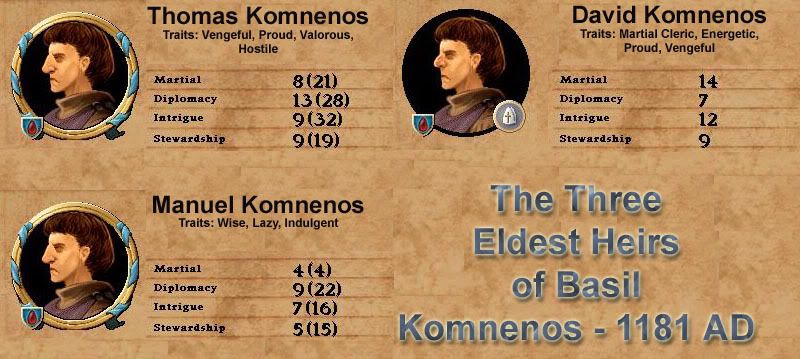
As you can see, David has indeed inherited alot of the closest stats to his father (relatively high martial, intrigue, average to above average in diplomacy and stewardship). In game he served as diocese bishop at the time the screenie was taken, hence his lack of totaled stats. Unlike his father, he doesn't have calm traits like temperate... instead he's vengeful and energetic about his vengefulness.
Thomas is next - his martial is above average, not stellar like his father or David, but his diplomacy is much better, and he has good intrigue and stewardship skills. This is despite a series of undiplomatic traits, such as hostile , proud and vengeful. When this screenie was taken, he had recieved a principality (his due as son of an Emperor), which he didn't have yet in 1181.
Finally there's Manuel (also a screenie of him with his future principality). Of the three, he's the most disappointing stat wise, and trait wise. He is wise, but also lazy and indulgent, inept at military command or keeping track of money. And yes - Thomas and Manuel have EXACTLY the same in game graphics. Freaky.
Fulcrumvale - No, Rodrigo does not launch a Byzantine coup, but our favorite Spaniard doesn't remain silent - he has a very interesting future ahead of him. Does this include a Jimenez dynasty? We'll have to see.
VILenin - You could argue that should Basil die this would have been the opportune time under a regular dynasty for the dynatoi, the military, and perhaps the church to intervene and push for a renowned and respected general to take the reins - Kosaca for example. But the Komnenoi by now are so respected, and so powerful, that both of these checks have been cowed. The sons of Basil will have to sort out the succession - somehow, some way. Knowing their temperments, blood will be involved. Keep in mind also, that only the three eldest sons of Basil have been shown... in the end, Basil has many more (7 sons when all's said and done I believe).
phargle: :rofl:
Estonianzulu - Drogo's been stymied, and with the arrival of David's army in Spain, it looks as if the Moors possibly have been as well. Basil's small armies have meant that the Romanoi treasury at this point is overflowing in gold. So what could possibly undo an immensely powerful, immensely wealthy state at peace? A couple knucklehead heirs could.
Servius Magnus - Something tells me David might be almost another Manuel - he's got the military skill and the intrigue. He just needs to step carefully before Mehtar can regain his footing.
AlexanderPrimus - First, THANK YOU FOR ALL YOUR HELP WITH THIS UPDATE!!! The one liners you brainstormed were perfect, and I've saved some of the others for later. No, Thomas definitely doesn't get it... Thomas is just a little dense in matters he doesn't care about.
Enewald - Well, if Mehtar was smart, he'd just forget about Thomas and move on. But, this being a Byzantine AAR, what are the chances of that happening? And no, the wars aren't realistic - the French armies in this game sat across the Po river and wandered back and forth sieging castles before chasing a German army, only to go back to sieging. I couldn't find a way to explain that in AAR, so having him just get stymied attempting the cross the Po worked better.
And no, the wars aren't realistic - the French armies in this game sat across the Po river and wandered back and forth sieging castles before chasing a German army, only to go back to sieging. I couldn't find a way to explain that in AAR, so having him just get stymied attempting the cross the Po worked better. 
DarthJF - Thomas is definitely not Nikolaios or Ioannis, and if he found out what hints Mehtar was dropping, there's no telling what his reaction would be. Considering his denseness, he probably wouldn't reciprocate, but considering that Mehtar is, undoubtedly, his best friend and closest confidante, would he merely turn a blind eye? Or would he lash out? Who knows...
canonized - Kind words as always. *bows* As for your Rodrigo... next update I'm going to try my best to fulfill your wish!
Have I started the next update? Yes and no... I know what will happen in it, and what I will include, but I have yet to type a single word. My goal? Have it completed before I take a quick trip out of town on Friday.
asd21593 - David definitely has some of his father in him. For everyone's perusal, I've made the following graphic showing the three principal heirs of Basil, all of whom will be making their presence felt in the coming updates (yes, smarmy, silly Manuel will reappear)...

As you can see, David has indeed inherited alot of the closest stats to his father (relatively high martial, intrigue, average to above average in diplomacy and stewardship). In game he served as diocese bishop at the time the screenie was taken, hence his lack of totaled stats. Unlike his father, he doesn't have calm traits like temperate... instead he's vengeful and energetic about his vengefulness.
Thomas is next - his martial is above average, not stellar like his father or David, but his diplomacy is much better, and he has good intrigue and stewardship skills. This is despite a series of undiplomatic traits, such as hostile , proud and vengeful. When this screenie was taken, he had recieved a principality (his due as son of an Emperor), which he didn't have yet in 1181.
Finally there's Manuel (also a screenie of him with his future principality). Of the three, he's the most disappointing stat wise, and trait wise. He is wise, but also lazy and indulgent, inept at military command or keeping track of money. And yes - Thomas and Manuel have EXACTLY the same in game graphics. Freaky.
Fulcrumvale - No, Rodrigo does not launch a Byzantine coup, but our favorite Spaniard doesn't remain silent - he has a very interesting future ahead of him. Does this include a Jimenez dynasty? We'll have to see.
VILenin - You could argue that should Basil die this would have been the opportune time under a regular dynasty for the dynatoi, the military, and perhaps the church to intervene and push for a renowned and respected general to take the reins - Kosaca for example. But the Komnenoi by now are so respected, and so powerful, that both of these checks have been cowed. The sons of Basil will have to sort out the succession - somehow, some way. Knowing their temperments, blood will be involved. Keep in mind also, that only the three eldest sons of Basil have been shown... in the end, Basil has many more (7 sons when all's said and done I believe).
phargle: :rofl:
Estonianzulu - Drogo's been stymied, and with the arrival of David's army in Spain, it looks as if the Moors possibly have been as well. Basil's small armies have meant that the Romanoi treasury at this point is overflowing in gold. So what could possibly undo an immensely powerful, immensely wealthy state at peace? A couple knucklehead heirs could.
Servius Magnus - Something tells me David might be almost another Manuel - he's got the military skill and the intrigue. He just needs to step carefully before Mehtar can regain his footing.
AlexanderPrimus - First, THANK YOU FOR ALL YOUR HELP WITH THIS UPDATE!!! The one liners you brainstormed were perfect, and I've saved some of the others for later. No, Thomas definitely doesn't get it... Thomas is just a little dense in matters he doesn't care about.
Enewald - Well, if Mehtar was smart, he'd just forget about Thomas and move on. But, this being a Byzantine AAR, what are the chances of that happening?
DarthJF - Thomas is definitely not Nikolaios or Ioannis, and if he found out what hints Mehtar was dropping, there's no telling what his reaction would be. Considering his denseness, he probably wouldn't reciprocate, but considering that Mehtar is, undoubtedly, his best friend and closest confidante, would he merely turn a blind eye? Or would he lash out? Who knows...
canonized - Kind words as always. *bows* As for your Rodrigo... next update I'm going to try my best to fulfill your wish!
Man, those guys look like they got made in a factory or something. Genetics is what I love most about CK.
General_BT said:Reply time!
AlexanderPrimus - First, THANK YOU FOR ALL YOUR HELP WITH THIS UPDATE!!! The one liners you brainstormed were perfect, and I've saved some of the others for later.
You're most welcome!

September 18th, 1186 – Konstantinopolis
Basil III Komnenos, Emperor of the Romans, King of Bulgaria, Syria, Croatia, Serbia, et cetera et cetera closed his eyes and took a long, deep drink of wine. His goblet finished, he poured another cup of the Peloponesian red for himself. Decisions came easier these days, after all the momentous events of the past few years, if there was a little bit of wine to them.
Things had been that way ever since David pulled a military coup and snuck a large army from Italy to Spain. The resulting campaigns had been whirlwind successes – David and Basil’s joint army crushed the Moorish Sultan twice, and high on victory, Basil’s sons went on a conquest spree. Thomas, with 15,000 men, raced to the north, besieging castles and towns alike at record pace, always at the front, always in the thick of the fighting. David’s campaign southward involved an invasion of Morocco proper, and was slower, more deliberate, and cost far fewer lives.
Yet even as the back of Moorish power in Spain and the West was forever broken, the Emperor’s two sons grew sharper in their rivalry, to the point they began conquering towns for the sole purpose of trying to outdo one another. Thomas constantly sent letters to Basil calling his brother a cad and a coward, pointing out that David never personally led troops in combat. David always shot back that Thomas’ campaigns were excessively bloody, and his penchant for hand to hand fighting downright foolish. No words, no matter how soothing or stern, seemed to temper the conflict. At the Christmas Feast in 1183, celebrated in Cordoba, the two even came to blows, with Thomas breaking David’s nose before anyone could intervene and stop the madness.
Yet their rivalry meant the end of the Moors in Spain. By New Years Day, 1186, almost all of Spain was under Christian rule once again, and David’s armies were hunting the last survivors of the Moroccan court deep into West Africa. By any solely military standard, the Third Spanish War was an unmitigated triumph of Roman arms. Yet for Basil, the more his sons fought, the more it became a personal tragedy.
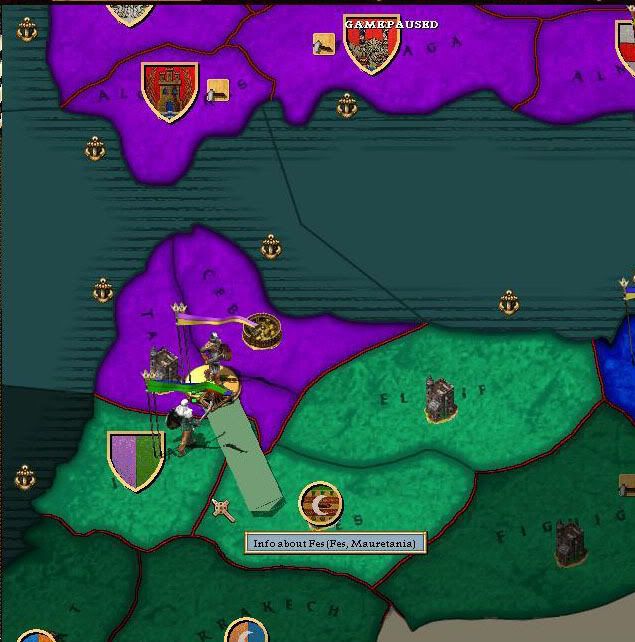
David’s invasion of Morocco. Basil’s son led some 18,000 troops on a brilliant, if plodding, campaign across Morocco.
In the spring of 1186, that Drogo II Capet sent a messenger to Basil III Komnenos, requesting terms for a truce. France and England simply could not afford to keep a levy in the field any longer, not with a potential Roman invasion of Languedoc from Spain. Sophie had estimated that by June of 1186, the Frankish monarch would be completely out of funds for any troops, let alone the massive forces that would be required to stay in Germany, Italy, and defend the south.
Yet the Romans were loathe to remain in the field as well. The Moors had been defeated, yes, but most of the conquered lands still needed pacifying. The Italian city states were restless, unwanting Drogo’s conquering armies, but also not wanting undo influence from Konstantinopolis. The dynatoi were loathe to have their wealth interrupted by new taxes to finance an invasion of France proper, and the Roman army was loathe to campaign so far from home after the exertions of Spain. Ironically, much of this discontent was stirred by none other than Heinrich of Germany, who was loathe to see his “fellow emperor’s” influence grow even more at Drogo’s expense. The situation in Germany had somewhat stabilized – it was clear Heinrich felt he could recover the remainder of his crown without the Eastern Emperor growing even more powerful.
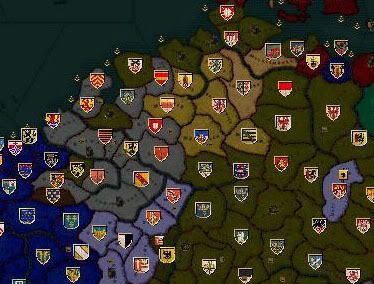
Germany in 1186. Heinrich has managed to subdue most of the rebellious nobility, with only the Dukes of Saxony, and Lower and Upper Lorraine still actively in the field against him. That caveat said, all have powerful forces and deep coffers, even if Drogo officially no longer backs them.
Drogo offered generous terms - the French King offered to recognize Roman rule in Spain, and cease his interventions in Germany and Italy. To cement the deal, he offered a final proposal – the hand of his daughter in marriage to Basil’s eldest son. With pressure from all sides, as well as his own personal demons menacing, Basil accepted.
So, in the summer of 1186, an uneasy peace settled over Christendom. Drogo’s armies returned home, which Heinrich continued his fight to quell the German nobility. The Moors defeated and crushed, Basil’s veterans received their pay and went home – something the warrior Emperor desired above all else. Basil, called the second Megos, the Illuminator, and above all, Megaloprepis, “the Magnificent,” for his campaigns and the prosperity at home, was a worn, tired man.
Time had not been kind to Basil. The Emperor was still only 39 years old, but already portions of his formerly dark hair were shot with gray, his face constantly pinched in pain from the numerous injuries bravery on the battlefield had earned him. His eyes, whose brown orbs had watched legions at battle, were now dim, filled with sadness at the memories of loved ones and friends gone and lost. His careworn face was now covered in a gristle of hair – uncharacteristic for a man that had shorn his face since his first whiskers grew.
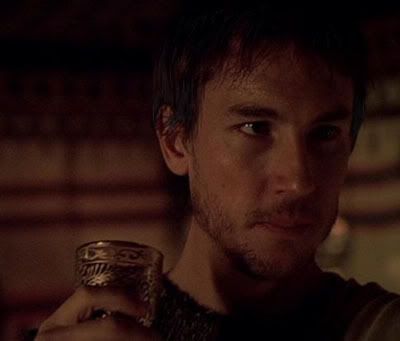
Peace had thus finally come over Spain. The Romans, however, were left with an enormous problem, literally the size of Spain – how to govern such a vast land, so far from the capital.
Enguerrand’s Lusitania had proven extremely resilient – at the height of the Moorish invasion, Enguerrand’s levies managed to hold the Moors off near Badajoz on several occasions. Yet Enguerrand himself, for all his promise, had shown himself keen to engage in the Roman vice of self-aggrandizement. He’d freely played the rivalry of Thomas and David, extracting money and concessions from both while giving little in return. So Basil was determined to expand the exarchate concept – but clearly, Enguerrand could not be in the lead in governing Hispania. The exarchates would need a supervisor, a hyperexarch who would speak and act in the Emperors name – but who to trust?
Logically, the answer would have been one of Basil’s sons, but the Emperor sadly knew that would be the worst possible answer. Hence the meeting this night between Basil and two of his most trusted confidantes – Rodrigo Jimenez and Clemente Kosaca, deep within the bowels of the Great Palace, newly reconstructed after the damages of the 1152 riots.
Clemente, despite now nearing forty, still looked ten years younger than his age. Some said the Megos Domestikos’ looks came from his austere diet – fruits, berries, nuts and bread with only a little wine. For his part, Rodrigo had fared much better than the Emperor. His blonde hair covered the few gray hairs coming in, and the wrinkles that were slowly coming into his face made him look ruggedly handsome, not aged. The Spaniard now boasting a slight paunch due to years of overindulgence, but he still looked spry and strong.
He would need all his strength, for what Basil would have him soon do.
In many ways, Basil regretted his decision, all those years ago, to campaign so much in Spain. Not because the Empire suffered – indeed, in the 17 years Basil III had reigned as Emperor, the Empire’s coffers had gone from empty to overflowing, she’d gained new provinces, the respect of the West, and peace in the East. Yet being away from Konstantinopolis meant that the politics of that city, and not Basil, raised his three eldest sons. Manuel had grown into a conniving young man, languid and devoid of motivation, but capable of plotting for petty reasons. Thomas was a born warrior, unmatched in battlefield skill, yet all to often absorbed in rage and jealousy that was far more harmful than good. And finally, David, the eldest son, had both his father and grandfather’s brilliance and subtleties, yet was a lustful womanizer with a smug sense of confidence that bordered on the dangerous.
Hence why Hispania was even more important. Basil wanted to give his sons, especially David, a chance to rule something – yet clearly, all of Spain would be too much for any of them. Basil remembered how audacious he was in his youth, and how battles and years on the throne had made him now a soul of caution. Mayhaps, a decade or two as an exarch or prince could mellow the more capable of his sons.
So the Emperor was now engaged, with the helpful mind of Clemente and Rodrigo, in parceling out bits of lands hither and thither. Delicate egos needed satisfaction, and lands needed good stewardship. Balancing the two requirements had been a grueling process.
So far, Basil decided to hand lands to his three eldest sons – young Heraklios, only aged 8, would have a principality later – likely the principality of Almeria, the lands Basil had earmarked from the original landing for his lost son Gabriel, taken away by the flux nearly ten years ago. In Basil’s plans, until Heraklios reached of age, Almeria would remain under direct Imperial administration, both in honor of Gabriel, and as an imperial foothold on Hispania should intervention be required to protect the exarchates from outside threats – or each other.
Thomas, the third son of the Emperor and his beloved wife, would receive Catalonia as the Exarchate of Terraconensis, named for the old Roman provincial name for the region. Based out of Barcelona, Thomas would rule a large and powerful dominion, including the island base of Menorca. Basil hoped it would satisfy Thomas’ ego to have such a powerful region, centered on the area of his own military conquests – yet, as Clemente gently reminded him, little could be done to mollify the young man’s jealousy of his oldest brother. So Basil arranged another step – Thomas, on his installation, was to marry Clemente’s eldest daughter, Sophia. For Basil’s friend, it would be an immense honor – instantly the Kosaca’s would be catapulted up into the upper echelons of Imperial politics, and Basil hoped the young Sophia’s alluring looks would distract Thomas from his persistent feud with David. Such was the hope – the Emperor had little faith it would work such a way.
Manuel, Basil’s second son, now 21, was in Basil’s estimation, the least capable of his three heirs. He was excellent at finding fine clothing and throwing lavish parties, but utterly worthless at managing a budget or military affairs. Basil would hand to him the Principality of Tangiers, carved from the northern parts of Morocco. A hand-picked bevy of staff would ‘assist’ the Prince in his affairs, likely running the principality in Manuel’s absence of care.
Finally, Basil’s eldest born, David, would receive the most powerful exarchate of all – Mauretania, including all the Moorish lands from Tangiers and Fez in the north to Ifni and the islands off the African coast in the south. It was an immense tract of land, wealthy, well tended from years of careful Moroccan rule – yet carefully removed from Spain proper, to keep David’s ambitions in check. In David’s hands would also be the deal to cement peace between the Empire and France – the hand of Drogo’s youngest daughter, Alienor. The sixteen year old Frankish girl had the looks of a cow and the graces of a bear, but any child from her loins would automatically have a claim, if distant, to the French throne. It was Basil’s distinct hope that the union would secure Romanion’s western borders – at least until the enemy Hagios Demetrios had spoke of long ago had been met and defeated.
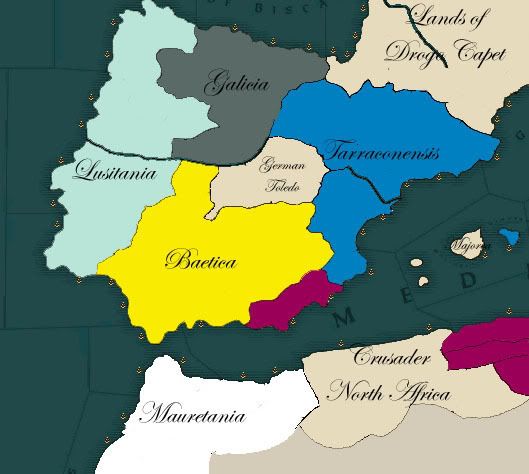
Divided Spain according to the Treaty of Cordoba, 1186. Spain and Morocco would be divided into five exarchates, all responsible to a hyperexarch and Konstantinopolis. Mauretania would go to David Komnenos, Tarraconensis to Thomas, Baetia to Romanos Thrakesios, and Galicia to Rodrigo Jimenez. Lusitania would remain under Enguerrand. In the middle of Spain lies the Duchy of Toledo, titularly a vassal to Heinrich of Germany.
“Well, that bad business is done,” Basil said quietly as he placed his seal on the requisite paperwork. He reached out, and took another swig from his goblet, draining the last of it.
“Indeed – do you think they’ll be happy with the arrangement?” Rodrigo asked quietly. Everyone knew what the answer to the question would be, but it still merited asking. Basil sighed.
“It fits in that the two most capable sons get lands they conquered. Thomas is going to complain that David’s realm is too large and wealthy, and David is going to complain that Thomas’ land is closer to Cordoba, and more importantly, Konstantinopolis,” the Emperor said quietly.
“There’s no quieting those two, let them squall,” Kosaca said bitterly.
Basil nodded, before motioning for the jug. Rodrigo looked at his friend, worry on his face, his hand stayed. So Basil motioned again, this time more urgently. Rodrigo nodded, but Basil couldn’t help but see the sadness in his friends eyes. Rodrigo knew.
Basil’s dreams had always been vivid. It’d been a dream from Hagios Demetrios that told him to accept peace with the Turk, and to march on Spain. Yet lately, his dreams had turned to nightmares. Such happened when a man campaigned at war for far too long. Instead of laughing memories of his friends, of Alexandros playfully chiding him for chewing his lip, or Vataczes grumbling, rumbling speech, Basil saw their desiccated corpses, amongst the hundreds of dead that visited him nightly.
His days were tormented by family squabbles and the constant infighting of Konstantinopolis. Spain, despite its battlefields and death, at least had a finality – when a Moorish sword struck your neck, you were done. The pain left you. In the city, the constant infighting, bickering, and politicking lingered, day after day.
Wine helped, grappa helped more, and a man that once prided himself on not drinking anything save water now tended to have a goblet of wine at his side at all times. Sophie and Rodrigo both had noticed the change with alarm. Part of Basil regretted Rodrigo even now seeing him like this – part of him just wanted it all to stop.
“One more goblet,” Rodrigo said quietly enough that Kosaca couldn’t hear.
“One more,” Basil nodded. He felt his fingers tingling – that was enough. More than that, and he’d stumble to bed and would have a headache and explanations to give to Sophie. Slowly, Rodrigo refilled his glass. Basil sighed, and took a sip. It tasted far better than it had even the day before.
“So we have two major exarchates left,” Basil set his glass down, looked at Clemente and sighed. “Galicia and Baetica.”
“Could you pop another son or two out of Sophia?” Rodrigo said in a deadpan, a wry smile on his face. Basil alone saw the hint of sadness in those eyes too.
“Bah!” Basil smiled with a sigh. Things between him and his wife were something of a scandal almost in Imperial politics. All the previous emperors had lovers or mistresses – Basil had famously (or infamously, in the eyes of many would be courtesans) stayed faithful to his wife – and she’d continued to give birth to children. Anna was born only six months ago, their fourth daughter.
“Well, seeing that isn’t a short term option,” Clemente grinned slightly, “then perhaps we need to look elsewhere. What about your nephew? Romanos Thrakesios?” Clemente asked.
Basil sighed, and closed his eyes. Even all these years later, the mere mention of that name brought back memories of Alexandros. The young man had grown into the spitting image of his father – tall, dark haired with a handsome face and a deep guttural laugh. He was proverbially in a good mood – no news could keep him down. Just like Alexandros.

Romanos Thrakesios, nephew of Emperor Basil
“He has imperial blood, Basil,” Kosaca pressed. “And he is intelligent, well regarded, and has shown some skill in the field. And, he’d honor the memory of your friend…”
“And it’ll firmly place Baetica outside of the ability of Enguerrand, Thomas, or David to toy,” Rodrigo added. “Since Romanos is still only sixteen and such a trusting young lad, you can fill his bureaucracy with staff loyal to Konstantinopolis, and make sure at least one of these exarchs is fully compelled to side with us.”
“It would,” Basil nodded, drinking another cup. He changed his mind – this wasn’t wine from the Peloponnese, it was Italian grappa. Even better – now his toes were tingling. “Clemente, draw up that paperwork as well. Fine, that leaves Galicia, and I know who I am handing that to.”
“Who?” Clemente looked up, “I’ll just draw that up as well, if you’d like.”
“Rodrigo here, and make sure it denotes his rank as Hyperexarch of All The Spains,” Basil said.
Coyly, the Emperor looked over his glass at his friend, and saw something remarkable – Rodrigo Jimenez standing stunned and speechless.
“Me?” Rodrigo asked, confused.
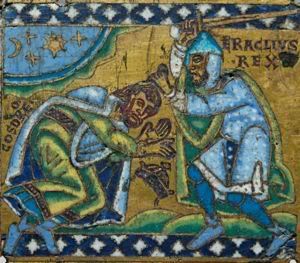
“Hyperexarchate Period” artwork is no a rare find in Spanish Churches, after the destruction of the Spanish Reformation in the 16th century. This piece currently resides in the Imperial Museum of Alexandria.
“Yes, you,” Basil grinned. He could feel the alcohol in him now. He didn’t care. “I don’t know of any other Rodrigo Jimenez in the city.”
“B…” his friend started, but Basil cut him short by raising his hand.
“You’ve served as Master of Spies for seventeen years, you’ve undone plot after plot and enemy after enemy. I think you’re well qualified,” the Emperor said, before taking a long draught of wine. “You tend to my personal business, and are one of four people that know of my condition.” The last part came out rather stiffly. Even in front of Sophie, Koutsos, Kosaca, and Rodrigo, Basil was still standoffish about his difficulties reading. “I trust you more than I trust some of my own brothers, Rodrigo. You have earned it.”
“B…but hyperexarch?” Rodrigo asked again. “Hyperexarch of All the Spains? Basil! I’m not of royal blood, though! And your sons…”
“Will learn to deal with it, as they will learn to deal with many things. All three could use a dose of modesty,” Basil set his cup down, looking back up at his friend. “Listen, Rodrigo. I know you, I can trust you, more than I can trust almost anyone else. You will manage the affairs of Spain equitably, you’ll treat the exarchs fairly, you won’t aggrandize yourself unduly – why should I not pick you?”
“Your sons will resent me, and resent you, for elevating me above them,” Rodrigo replied.
“Let them resent – they will still inherit my domains, and you will not. Thomas is after the diadem and the diadem alone, and David already wears the chain of Kaisar. As for Manuel…”
“He’s piddling,” Clemente said simply. “Prince of Tangiers. Far too small to cause you trouble up in Galicia.”
“Your capital as hyperexarch should be in Cordoba, I think,” Basil went on, before taking another swig. Another goblet gone – seven on the night so far. “Centrally located, and in the heart of Romanos’ Baetica, so you’ll be surrounded by loyalists. Effectively you can keep any of the other exarchs in line.”
“Basil, I appreciate this,” Rodrigo said slowly, “but I do not think…”
“Clemente, hand me the paperwork,” Basil held up his hand while looking directly at Rodrigo. “You don’t understand. This is likely the most important position I am ever going to give you,” Basil said. He could feel the tingling everywhere – he knew it was time to stop, but just looking at the jug on the other table made him want more. “I have seen enough war. I want peace, the rest of my reign. Your job, Rodrigo, is to keep the peace in Spain, so I can keep the peace here.”
Clemente handed the Emperor the paperwork, while sighing, “and if you don’t, and Thomas, Enguerrand, Manuel and David all end up at each others throats, I shall have to become a busy man. And I don’t think anyone here wants the Megos Domestikos busy after years of war.”
“Think on it, Rodrigo. How long would it be before Thomas had his garrisons out of barracks if David were hyperexarch? Or vice versa? And how long would it be before they both were in the field if Enguerrand was there? My brother thinks he’s clever, but you, Rodrigo, are ten times as clever. You can keep them in line. You must keep them in line. I will be in the capital, and Thomas and David especially will want to politick against each other. We must have peace between them, even if its forced by you! The alternative…”
“…civil war, more than likely,” Kosaca said quietly.
Last edited:
Well-written update
I see many future problems for the Empire. (Basil's alcoholism, brothers causing civil war)
 asd
asd
I see many future problems for the Empire. (Basil's alcoholism, brothers causing civil war)
You’ve always been excellent at distilling tragedy into the story, and in this section it almost seems to leak out of Basil’s pores. All of the promise from all of those years ago just seems to have died, killed slowly in too many wars and too much alcohol and the knowledge that civil war between his sons is more or less inevitable at this point.
The writing here is just brilliant.
The writing here is just brilliant.
I agree that your writing is absolutely brilliant. It just keeps getting better.
Poor Basil, though, deep in his cups while his sons destroy his empire. I must say, this does not bode well for the future.
Hopefully some scion of the Komnenoi in the distant future will be able to restore Romanion again!
Poor Basil, though, deep in his cups while his sons destroy his empire. I must say, this does not bode well for the future.
Hopefully some scion of the Komnenoi in the distant future will be able to restore Romanion again!
Rodrigo! At last! That's my boy, Basil. Wisest decision in your entire, magnificent reign.
You seem to hint that this will be his epithet in the end, right? And I fear that, like the other Magnificents in world history -- Lorenzo of the Medici and Suleiman of the Turks -- his reign will mark the pinnacle of a golden age and subsequent reigns will only see decline, tempered by occasional bursts of attempted revival, obviously with the legend of the Magnificent hounding the dreams and ambitions of each new generation forward, like Demetrios' legend has been, and Nikolaios' as well to more astute eyes (and even Manuel, given time, I suspect!).
Also, it's a testament of the loyalty of one of the sharpest men in Constantinople that the most prominent survivor of the Spanish nobility of the age didn't even think of himself as a candidate for hyperexarch until Basil mentioned it himself. And your caption on the "hyperexarch era" makes me think that, while his career in the capital is at an end, the tale of Rodrigo Jimenez as statesman is far from done. I don't know about the others, but I think you've succeeded in creating a memorable non-royal character in this family saga that will remain in us readers' memories long after other, lesser characters have come and gone from their stages. He's just the Tall, Dark, and Snarky (see TVTropes site for details ) cool sidekick that the Hero-Emperor needs.
) cool sidekick that the Hero-Emperor needs.
Mehtar seems to be the next generation non-Komnenid main character, but I doubt the wily Nikolaios-to-be is going to match the Spaniard in capturing our attention. It doesn't help in my case that he's a supporter of that annoying brat Thomas with his stupid ideas of "Roman" and "Greek" and "cowardice" that's devoid of any sense of reality. o Valorous characters are fine, Thomas would've done decently or even pretty well given any other time, but a warmonger Emperor who are better at making breaches than healing them, when the Christian world and even the Muslims ought to unite to face the Mongol threat? Oh boy. David better step up to the plate lest he fall victim to Mehtar's plots at last.
o Valorous characters are fine, Thomas would've done decently or even pretty well given any other time, but a warmonger Emperor who are better at making breaches than healing them, when the Christian world and even the Muslims ought to unite to face the Mongol threat? Oh boy. David better step up to the plate lest he fall victim to Mehtar's plots at last.
Though, like Basil and I think Rodrigo, I wish Alexandros was still here. He'd be up there with Rodrigo in upholding the glory of the Empire, a sword to another's shield -- he did while he lived -- while it seems another childhood friend Bernard von Baden has long since faded into obscurity.
You seem to hint that this will be his epithet in the end, right? And I fear that, like the other Magnificents in world history -- Lorenzo of the Medici and Suleiman of the Turks -- his reign will mark the pinnacle of a golden age and subsequent reigns will only see decline, tempered by occasional bursts of attempted revival, obviously with the legend of the Magnificent hounding the dreams and ambitions of each new generation forward, like Demetrios' legend has been, and Nikolaios' as well to more astute eyes (and even Manuel, given time, I suspect!).
Also, it's a testament of the loyalty of one of the sharpest men in Constantinople that the most prominent survivor of the Spanish nobility of the age didn't even think of himself as a candidate for hyperexarch until Basil mentioned it himself. And your caption on the "hyperexarch era" makes me think that, while his career in the capital is at an end, the tale of Rodrigo Jimenez as statesman is far from done. I don't know about the others, but I think you've succeeded in creating a memorable non-royal character in this family saga that will remain in us readers' memories long after other, lesser characters have come and gone from their stages. He's just the Tall, Dark, and Snarky (see TVTropes site for details
Mehtar seems to be the next generation non-Komnenid main character, but I doubt the wily Nikolaios-to-be is going to match the Spaniard in capturing our attention. It doesn't help in my case that he's a supporter of that annoying brat Thomas with his stupid ideas of "Roman" and "Greek" and "cowardice" that's devoid of any sense of reality.
Though, like Basil and I think Rodrigo, I wish Alexandros was still here. He'd be up there with Rodrigo in upholding the glory of the Empire, a sword to another's shield -- he did while he lived -- while it seems another childhood friend Bernard von Baden has long since faded into obscurity.
Oh boy. Imagine if Thomas wins. Imagine him fighting Mongols? Mongol Khan would think that Thomas was greatest asset to Mongols since invention of composite bow. He would simply charge them. And we know what happens to armies that try to take Mongols head on.
Ahh Rodrigo my favourite guy XD An excellent chapter , i liked the tingling imagery for sure haha that made my toes tingle just reading it waiting for that moment when my dear Rodrigo would be elevated .
All we need now is for Basil to discover his youngest doaughter is half Spanish , Sophie to run off with Rodrigo , and Rodrigo to conspire with one of Basil's sons to end the slipping rule of Basil in exchange for making him the first Latin King of Spain !!!!
All we need now is for Basil to discover his youngest doaughter is half Spanish , Sophie to run off with Rodrigo , and Rodrigo to conspire with one of Basil's sons to end the slipping rule of Basil in exchange for making him the first Latin King of Spain !!!!
Irenicus said:You seem to hint that this will be his epithet in the end, right? And I fear that, like the other Magnificents in world history -- Lorenzo of the Medici and Suleiman of the Turks -- his reign will mark the pinnacle of a golden age and subsequent reigns will only see decline, tempered by occasional bursts of attempted revival, obviously with the legend of the Magnificent hounding the dreams and ambitions of each new generation forward, like Demetrios' legend has been, and Nikolaios' as well to more astute eyes (and even Manuel, given time, I suspect!).
My thoughts exactly. I have a hunch the threat will be of a more.. eastern flavor. I think you can guess.
Cyreidel said:My thoughts exactly. I have a hunch the threat will be of a more.. eastern flavor. I think you can guess.
I have my suspicions as well, most notably... Khan!
A wise decision indeed, let's hope our Rodrigo is nothing like canonized's Rodrigo! We need a good, strong and peaceful Iberia!


